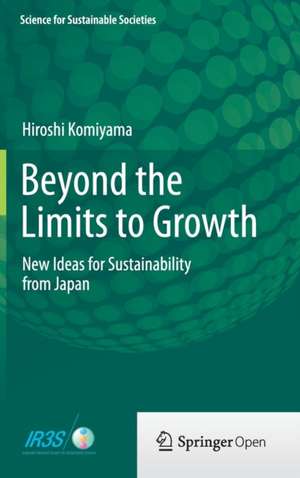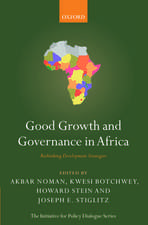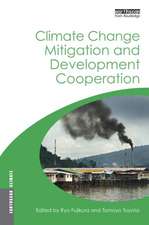Beyond the Limits to Growth: New Ideas for Sustainability from Japan (Science for Sustainable Societies): Science for Sustainable Societies
Autor Hiroshi Komiyamaen Limba Engleză Hardback – 10 mar 2014
| Toate formatele și edițiile | Preț | Express |
|---|---|---|
| Paperback (1) | 412.13 lei 6-8 săpt. | |
| Springer – 27 sep 2016 | 412.13 lei 6-8 săpt. | |
| Hardback (1) | 420.58 lei 6-8 săpt. | |
| Springer – 10 mar 2014 | 420.58 lei 6-8 săpt. |
Preț: 420.58 lei
Nou
Puncte Express: 631
Preț estimativ în valută:
80.50€ • 87.47$ • 67.67£
80.50€ • 87.47$ • 67.67£
Carte tipărită la comandă
Livrare economică 21 aprilie-05 mai
Preluare comenzi: 021 569.72.76
Specificații
ISBN-13: 9784431545583
ISBN-10: 4431545581
Pagini: 136
Ilustrații: XXIX, 103 p. 30 illus., 29 illus. in color.
Dimensiuni: 155 x 235 x 13 mm
Greutate: 0.4 kg
Ediția:2014
Editura: Springer
Colecția Springer
Seria Science for Sustainable Societies
Locul publicării:Tokyo, Japan
ISBN-10: 4431545581
Pagini: 136
Ilustrații: XXIX, 103 p. 30 illus., 29 illus. in color.
Dimensiuni: 155 x 235 x 13 mm
Greutate: 0.4 kg
Ediția:2014
Editura: Springer
Colecția Springer
Seria Science for Sustainable Societies
Locul publicării:Tokyo, Japan
Public țintă
Professional/practitionerCuprins
1 “Diffusive Demand” and “Creative Demand”.- 2 The 21st Century Paradigm and the Role of Information Technology.- 3 “Vision 2050” as the Rescue of a “Limited Earth”.- 4 Finding a Way Out Through Creative Demand, I.- 5 Finding a Way Out Through Creative Demand, II.- 6 Toward the Realization of a “Platinum Society”.
Recenzii
“This book on sustainable development … is an exceptional text, scientifically supported, very well written and agreeable to read that approaches in a very clever and optimistic way that issue. Due to the very well achieved conceptual frame, practical examples, new ideas and clues on the sustainable development subject it can serve as book text in graduate and post-graduate courses. Also indispensable for policy makers, managers and economists. Important for the whole people concerned with Earth future.” (Manuel Alberto M. Ferreira, International Journal of Latest Trends in Finance & Economic Sciences, Vol. 6 (1), March, 2016)
Textul de pe ultima copertă
At a time when contemporary challenges seem to many to be insurmountable, this book offers an optimistic view of the future and provides a road map for societies to get there. Drawing upon extensive research and many years as a thought leader in environmental and sustainability issues in Japan and internationally, Hiroshi Komiyama analyzes the most pressing challenges to the attainment of sustainability of economically advanced nations and argues forcefully for Japan to lead them out of the present dilemma through active promotion of creative consumer and societal demand. He shows how an active industry–government–academic partnership can provide the environment needed to promote such new creative demand and illustrates its potential through presentation of a Platinum Society Network that was launched on a regional basis in Japan in 2010 to facilitate the solution of common issues through the exchange of information and ideas. What is perhaps most surprising about the text is its unwavering optimism supported by hard evidence, history, and insightful observation. Problems arising from new paradigms of the 21st century (what the author refers to as “exploding knowledge, limited Earth resources, and aging societies“) thwart sustainable development in advanced and developing countries alike. All countries will struggle with issues that evolve from these paradigms including diminishing resources, expanding budget deficits, and growing global environmental problems. This window on potential practical pathways and solutions should be of interest to all those engaged in seeking ways to meet these contemporary challenges.
Caracteristici
Provides fresh insights to the challenges of and pathways to sustainable societies Includes a chapter on the realistic development of “platinum societies” that will serve as models for the future Shows how new consumer demand for quality will determine the development of new sustainable technologies in both developed and developing countries Includes supplementary material: sn.pub/extras






























